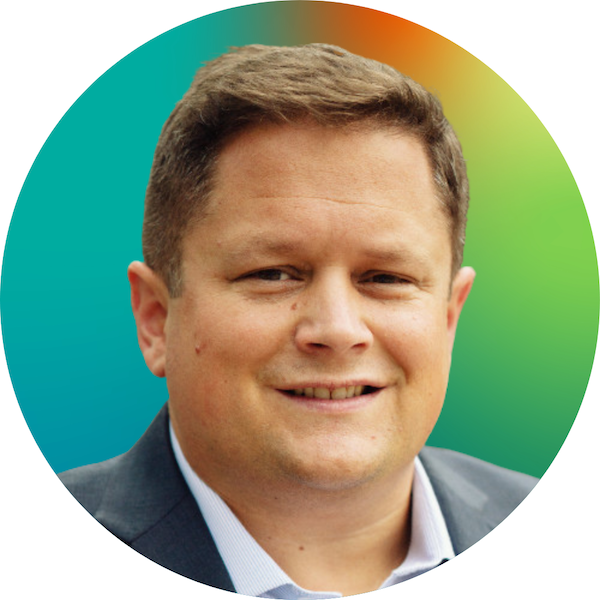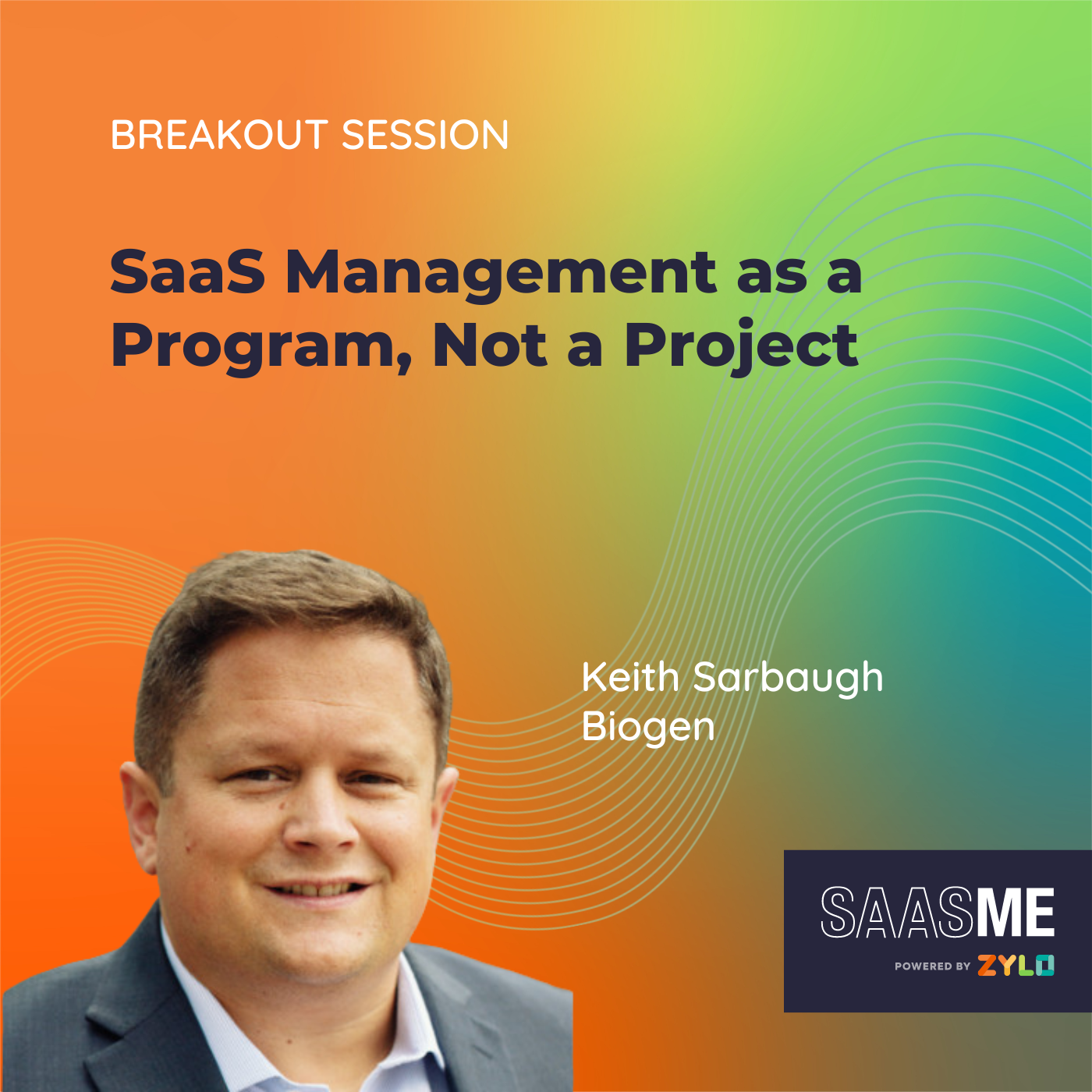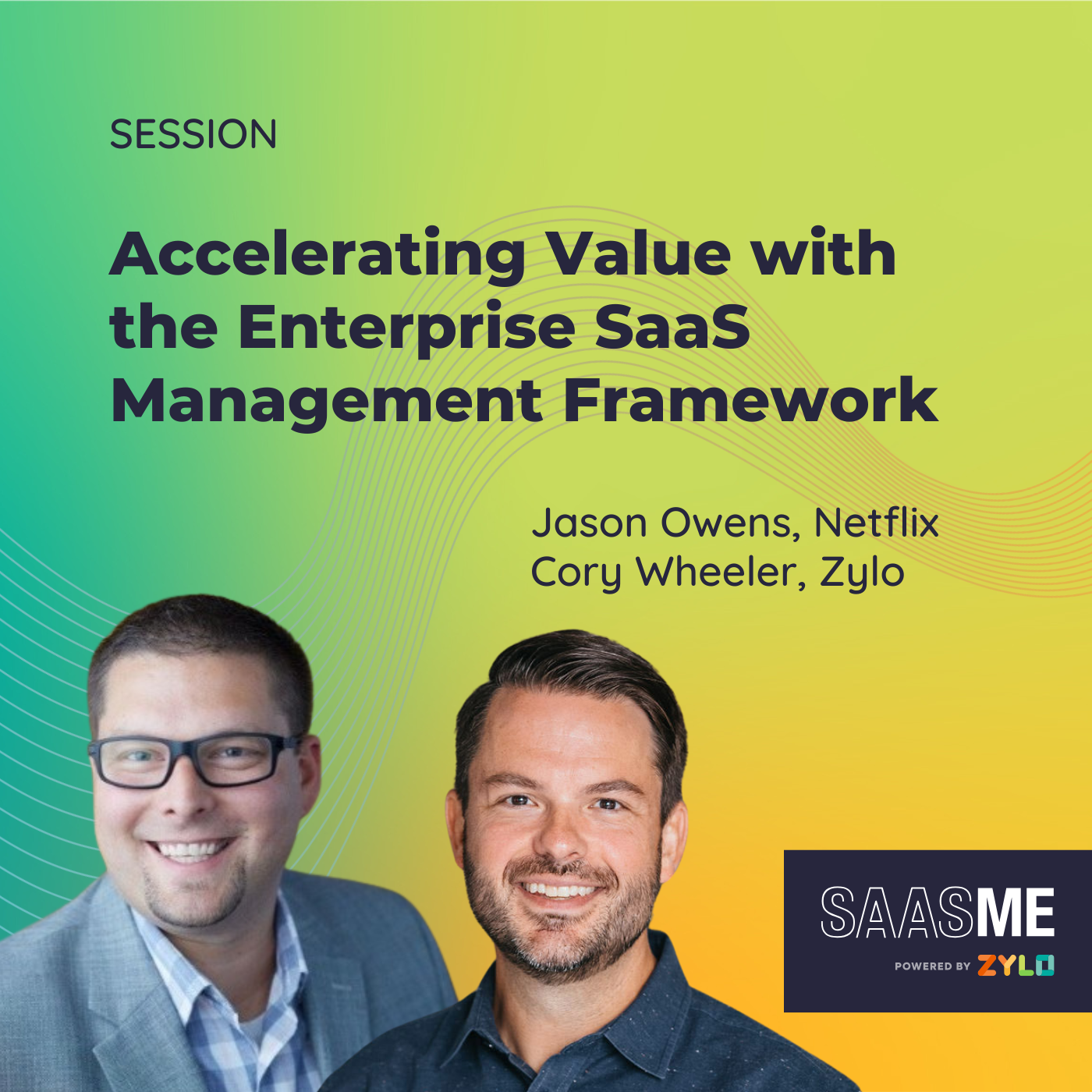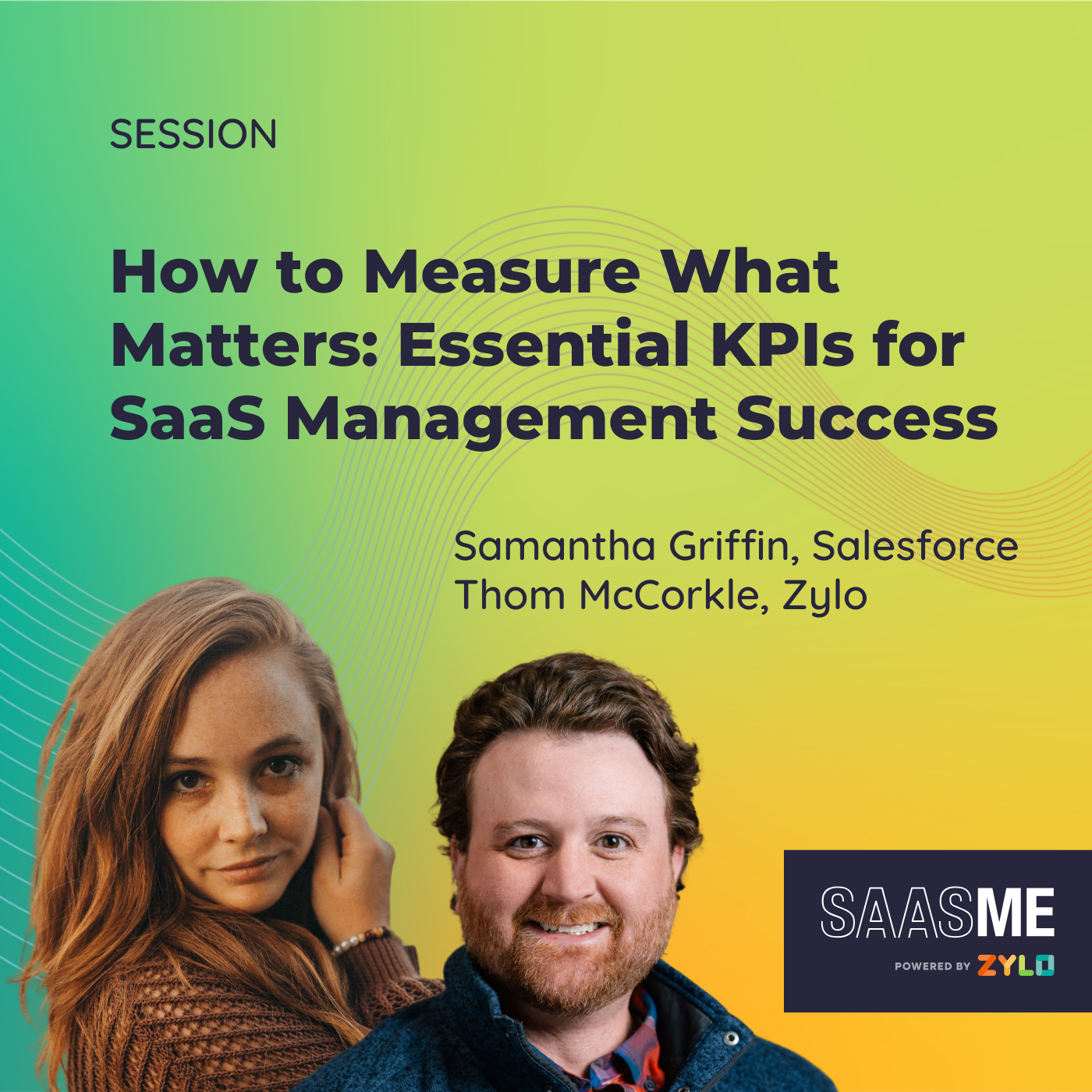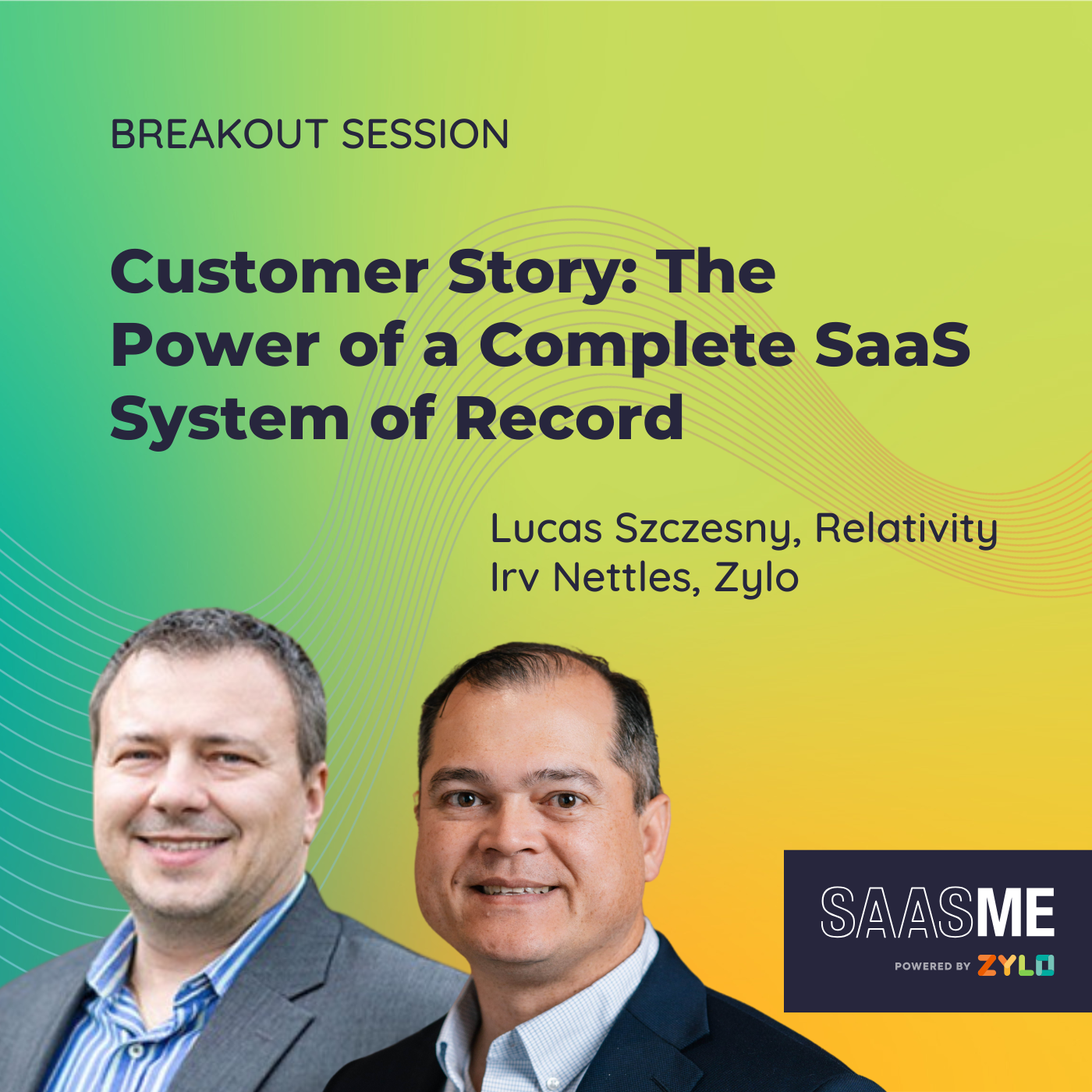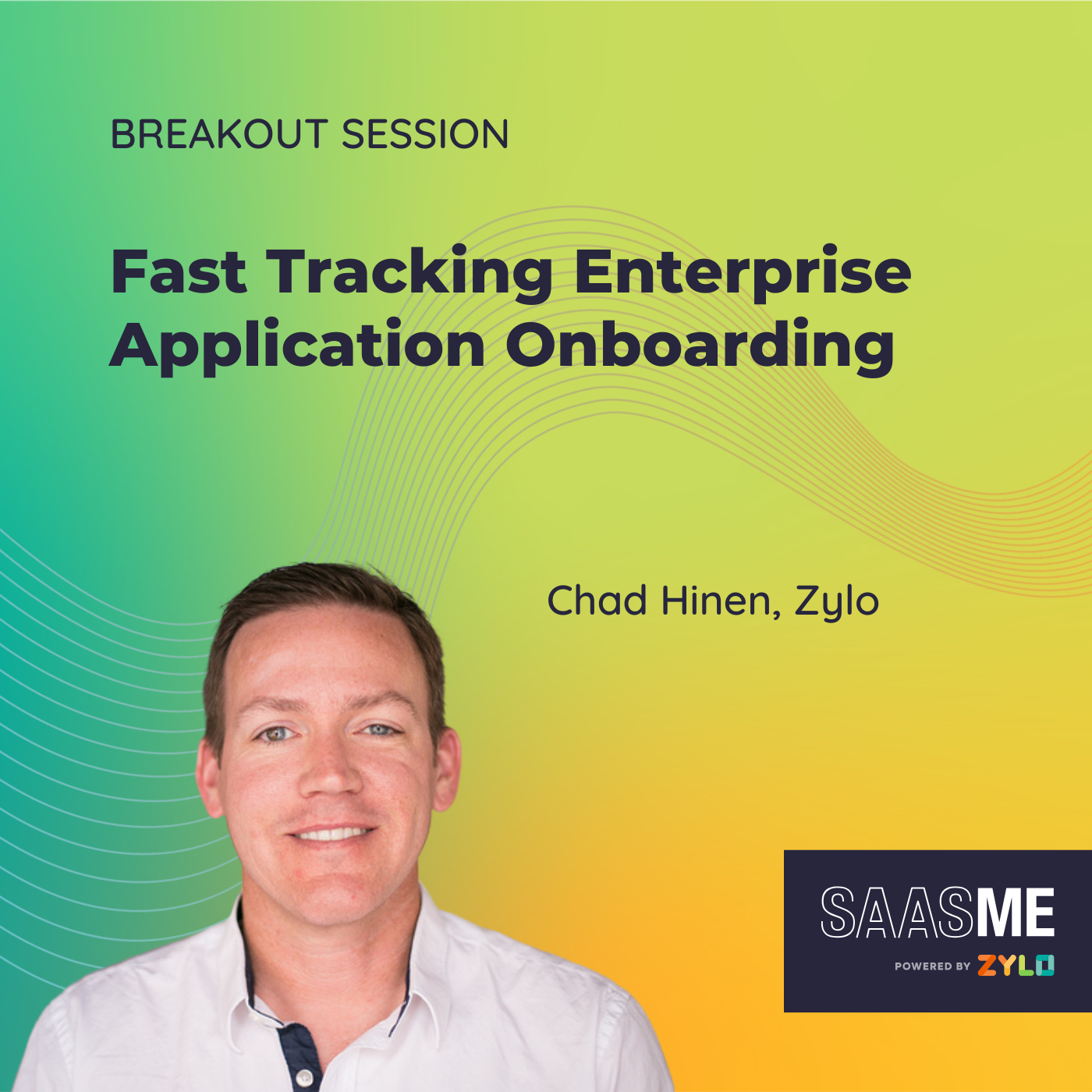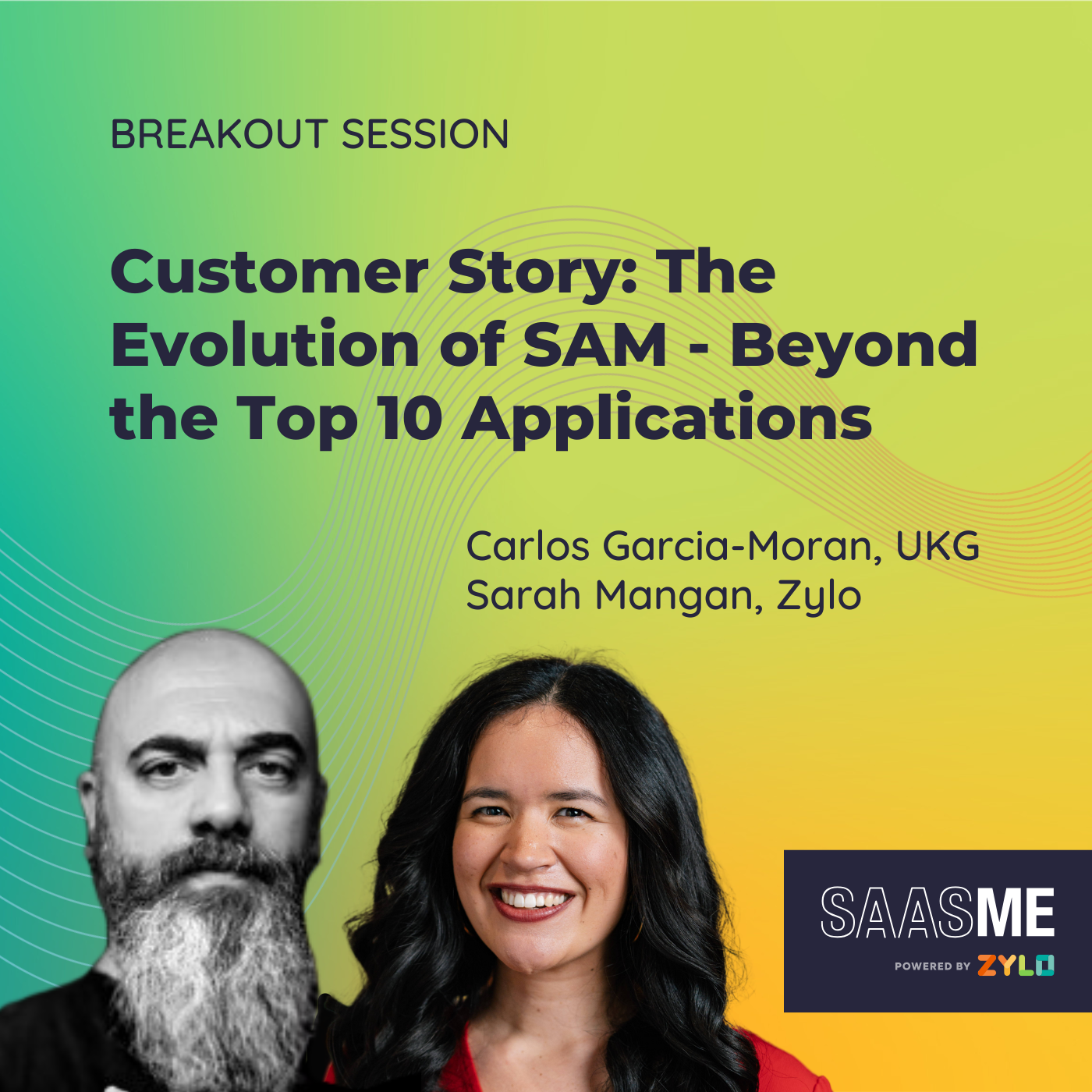SaaS Management as a Program, Not a Project
- 0.5
- 1
- 1.25
- 1.5
- 1.75
- 2
Keith Sarbaugh: Thank you all, for joining the session today. I'm joined by my partner in crime, Derek Crow here. He and I are both at Biogen and we're here to talk to you today about our implementation of Zylo. We're just about to the one year mark and how we've thought about it as a program, not a project.
Keith Sarbaugh: So Biogen, we're a global bio pharmaceutical company, operations around the world. My responsibility at Biogen is to lead infrastructure, IT architecture and IT operations. Derek is also on the team and has a big role in how we do hardware and software asset management. So we'll talk to you today about our experiences. One, how did we know we had a problem? That was kind of step one and getting resolution to the problem, owning it. What was our approach for the Zylo implementation and what are some key things we learned along the way? How we knew we had a problem?
Keith Sarbaugh: So like was mentioned earlier today, software subscription, SaaS licensing, supportive software, that's a substantial portion of our budget. It's the second largest line item in our OpEx budget right behind Comp& Ben. So it's a very material area of spend. I'd say it's growing and has been growing for a number of years and the disconcerting thing to me, was the way we approached the renewals, were sort of on autopilot where we weren't really thinking critically about the renewals that were coming forward. They would often come across my desk with," Our license expire in two days, can you approve the extension by a year?" And just not a lot of discipline or rigor into," Are we renewing the right quantities? What do we think about the pricing," and managing that in the way that we would all expect as shareholders. So that was part of the problem.
Keith Sarbaugh: We knew there was opportunity, we could see it from a savings and cost containment standpoint, from a compliance, and just the burden of managing so many renewals, I think we have 360 something software products that are sort of in this space and I'll say we've not had a good way of tracking that, sort of forecasting what's coming due and managing that in a way that gives us a chance to influence and manage those subscriptions responsibly.
Keith Sarbaugh: So a big part of our challenge was; how do we get organized? How do we make sure we're bringing data to the renewals and doing the right thing at renewal time?
Keith Sarbaugh: How we approached it, it was kind of funny, it's interesting to think about, we have this problem and we thought adding another tool to help us manage a bunch of other software tools was the answer. I was confident it was.
Keith Sarbaugh: This is my second time around with Zylo, I'd used it at a previous employer. I knew what it was capable of, but had a lot of work to do to kind of sell the value inside of Biogen. So before we did the agreement with Zylo, we did some look around. We looked at sort of the big deal software products where there's that API integration layer to try to quantify how much opportunity we thought was there in the big deal products. And we saw something like$900, 000 to a million dollars of opportunity just on the big deal products a year. We knew there was a whole host of smaller kind of mid- sized products that we could gain visibility through Okta SSO integration. We saw that at about a million dollar opportunity. So we made the rationale to go in with Zylo based on the big stuff.
Keith Sarbaugh: As soon as we got the implementation in, one of the first areas we focused on was building the integration with Okta, so we could get some insight into all the applications that sit behind Okta. And I think there were about 160 apps in that domain, right out of the gate, we hit about$ 400,000 of savings and a handful of renewals. And you can see some of those titles may look familiar to on the screen here. That's been a big value for us.
Keith Sarbaugh: I think nobody can argue with software renewals need more discipline and certainly on the big deal renewals, we were trying to put that discipline into it, but there's no way with the resources we had that we could sort of scale that and manage these in a professional way.
Keith Sarbaugh: So for us, the big deal API integrations that mattered, the Okta integration, so we could see utilization of those products behind MFA, that's been a big piece of value for us.
Keith Sarbaugh: I should mention, if you guys have questions, feel free to drop them in the chat. We can hit them at the end or as we go through this.
Keith Sarbaugh: So think big, start small, then we put a big focus on," Okay, we've got the platform up and running, how do we integrate it into our operations and not make this just one more thing on the plate of people who are already busy with a whole bunch of other day jobs?" So we looked really hard to say," Let's not create something new, let's integrate back where we can." We're using Zylo as kind of the library, the platform to track all of our renewals. We've been able to bring a little better foresight into what's coming through the Zylo platform. We've integrated it into some operational processes where we have monthly operational reviews where we're focused on running our business holistically. This is now a standing part of that review.
Keith Sarbaugh: We've put governance in place for renewals about rules of based on threshold to spend and set expectations with application owners that we're looking at this stuff. So when you bring a renewal forward, we better have done some level of analysis on; what do we have, what are we using and what do we need going forward? The workflow functionality, we've gone all in on a few applications, Zoom is the one I think we're most sophisticated on.
Keith Sarbaugh: We go all the way through to reclamation of unused licenses and use it start to finish for Zoom. We have other large products that we've implemented: Workflow but stops just short of reclamation on those, that's a journey we continue to press on and we run that on a monthly basis.
Keith Sarbaugh: One of the big keys is using the visibility that Zylo creates in our conversations with different stakeholders. In Cory's session just a while ago, he mentioned a lot about, there are different groups of stakeholders who care about different things and I can't tell you how true I've seen that play out to be both here at Biogen and at my previous place.
Keith Sarbaugh: So we've got a group of folks who care about Zylo, between IT, procurement and finance, we're kind of core stakeholders to the platform and we've made sure we've created really simple, clear dashboards to track our progress and size the opportunity. We keep those in front of the stakeholders on a very regular basis and are trying to keep it relevant in their eyes because we know the more leaders that know about it, are asking questions about it, the better discipline that's going to drive down in the organization.
Keith Sarbaugh: So we've got views based on who the stakeholder is, we've set targets, we'll talk about that a minute. And we've got line of sight and ways to track how we're progressing against the goals that we set for renewals. Our renewal process. We're using Zylo as the front end for all of our renewals. We have other tools as I'm sure many of you on the call do as well, whether it's Flexera and so on. But Zylo is kind of the front door for everything and it's our one source of truth when it comes to renewals. We're able to map those out ahead of time. In my first few months with the company, as the year came to a close, it was December and we were feeling good, like we might be ready for year end and then 30 or 40 renewals hit in the last three or four days of the year. We vowed at that point that, that wasn't going to happen again, and Zylo's been a big sort of the foundation for how we organize and make sure we're aware of what's coming forward. So that's mapping it out and then trying to see it far enough in advance.
Keith Sarbaugh: I mentioned this earlier, a lot of times these things pop up and the invoice comes across and we got to renew tomorrow, we're going to lose access. So that's a horrible place to be, right? You have no opportunity to influence the deal. Our goal was to kind of pull the analysis and the critical thinking forward and be in a position to negotiate and renew on terms that make sense for our business. So kind of putting us a little bit back in the driver's seat.
Keith Sarbaugh: Workflows, I mentioned this briefly before, so we're all in on Zoom, we've got other apps like Appian, we use Appian's product for low- code, no- code development, where we'd implemented the workflow and have found good success with kind of regularly running those trying to create a regular motion or regular cadence. So that's not a kind of one time, a year, an annual event, but it's a monthly event or doing it on a whatever basis is logical for the product.
Keith Sarbaugh: Visibility. I mentioned earlier, visibility being key to stakeholders. We've actually created a dashboard where we sort track overall spend and you can go to this dashboard and see any product; what are we entitled to, what have we deployed, what are we actively using? So any point in time, we have one source of truth for this data that before, honestly some of this data we didn't have anywhere and what we did have, was sort of scattered amongst multiple systems and email files. So the dashboard matters. We set a goal this year of saving a million dollars in renewals and we're measuring that quite conservatively. I'm happy to say we're well on track to hit that in our first full year of the implementation. So kudos to the team and the function for pulling it through like we have.
Keith Sarbaugh: And again the dashboard, you could get really sophisticated with dash boarding and metrics, we chose to keep it ridiculously simple so that anybody could pick it up who didn't know anything about Zylo or what it was and kind of make sense of it. That's been a big key to the success, I believe. Data quality in a system like Zylo, it's going to sink or swim based on the quality of the data that's in the system. I heard Ben or somebody mentioned that earlier today. We set some really clear goals of data quality we wanted to achieve. We track that on a monthly basis to ensure we're continuing to improve the quality of the data that's in the system, so that's been key to building trust in the system, and if it's going to be the foundation of our operations, we want people to trust it and act on the insights versus argue with the data they're seeing in the system.
Keith Sarbaugh: I think in summary, really think about the big opportunity, start small and win quickly to prove value. That was key to our success. Integrating the tool and the methodology and the discipline into already existing operations. So don't create something new, don't make it something additional that people have to do, but it's integrated into how we get work done.
Keith Sarbaugh: We need a vast group of stakeholders recognizing, they all come with different interests. So how do you engage them and get excited about the capability here being a tool for them to achieve what they want to achieve, in any case. I think that's been a big help. Set some goals, track your progress against the goals and then again, don't underestimate the importance of this being a team sport needing broad collaboration and cooperation. I hit a lot very quickly.
Keith Sarbaugh: Derek, I don't know, is there anything from your seat that we should mention that I didn't already mention?
Derek Crow: Yeah, do you want me to take the question on the line too?
Keith Sarbaugh: Oh sure. Yeah, I didn't even see that.
Derek Crow: Yeah, so just a few things. So first answer the question. Outside of the direct integrations that we set up, we also have about between$ 15 and 20 million dollars that we leverage, that we are actually getting usage for that through the Okta integration. We also have a cadence set up because there's either apps that need to be behind Okta that are not, or those that we still haven't connected yet, so 15 and 20 and growing. Keith, I think you covered really the main points. The only thing else I'd say is, people think about renewals a little bit differently, but being able to go into a discussion with objective data about who's using it, who's not, how much, and putting a dollar value next to it, ends up being much more powerful than other arguments. So the key for us is to try to get into the data, qualify some of those opportunities that we think are the highest priority and focus on these. We've looked at this as a bit of a journey, that the first year we wanted this to pay for itself, plus secure the foundation and just get better at it as we go. So the tool's great, the support's been great, but we've also as a team took some time to look at what are the top opportunities to make sure we really nailed those.
Keith Sarbaugh: And I think one of the things from an OCM perspective, so we like many of the companies I'm sure on the line today have a very sharp focus on managing costs and driving out OpEx. We're trying to position this as a; while we run the tool and sort of manage it centrally, we're kind of positioning it as a tool for the masses and when we get a win on a license renewal, that savings that the person that sort of owns the tool and owns that renewal, can take credit for. So yes, we care about it and for sure we have a view on it centrally, but set it in a way for the organization to feel like they're getting pressure to hold costs down, we can help them meet the pressure that they're getting and I think that's been a big part of the success as well, making it a win- win for everybody involved.
DESCRIPTION
Ready to shift from reactive to proactive SaaS Management? Learn how Keith Sarbaugh, Vice President, IT Infrastructure, Architecture and Operations at Biogen and his team have established SaaS Management as a true program - creating programmatic and repeatable optimization motions to drive smarter purchases and renewals at scale
Today's Guests
